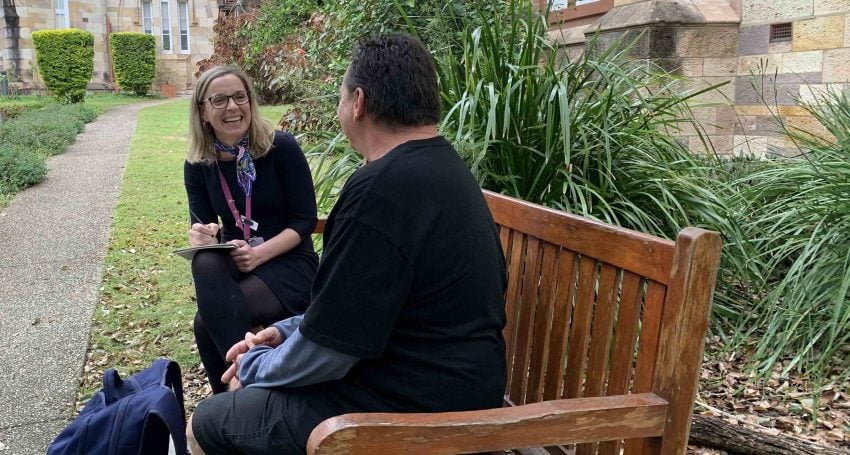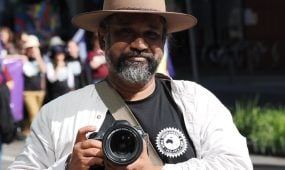Rough sleeper chews the climate cud
Features
“I think I have some unique insights about the climate because I have been sleeping in it for nearly 30 years in Queensland. I have noticed that there is less rain than before, but when it does rain, it rains a lot. And, the storms are much more severe. And, winters? What winters?” reflects Brisbane rough sleeper, Sean Higgins

I think I have some unique insights about the climate because I have been sleeping in it for nearly 30 years in Queensland.
I have noticed that there is less rain than before, but when it does rain, it rains a lot. And, the storms are much more severe.
And, winters? What winters? Locals think our recent winter was cold, but it was not. The winters 30 years ago were much colder. Back then the winters were also much longer. I do not need as many warm clothes as I used to.
The summers are hotter. It is more humid. I would not know about the glare though because I have always had to wear sunglasses.
Fellow long-term rough sleepers also often say that it is not as cold as it used to be and that it is hotter in the summer.
In the late 80s I worked as a station hand in the Northern Territory. Because of this and because I have been sleeping rough for nearly 30 years I am not exactly soft when it comes to the weather.
We all know that the main cause is the emissions going up into the atmosphere.
Compared to the 80s, there are a lot more cars on the road now. For sure our electricity demands have also increased, which means more pollution in the atmosphere.
On top of this, we are cutting down forests, which means that carbon dioxide is going through the roof. This is happening here and in the Amazon, which is known as the “lungs of the Earth”. Our desire for palm oil products – it seems to be in nearly everything – is a main reason why the Amazon is being cut down. I think I read that it was another record year this year for deforestation in the Amazon.
Advertisement
Bushfires are definitely made worse by climate change. I worry about what this does to the families out on the land – those living on the land – and to native animals, such as kangaroos, wallabies, wombats, koalas, birds, native bees, other insects. I read in the paper that at least 1 billion animals were lost in the Australian 2019-2020 bushfires. That is shocking.
We have brought in wooden cutlery to reduce plastic, which is good, but then other things take its place – like vaping tubes. I see them everywhere.
Take it from me, you do not need a lot to be happy. I have my clothes, my books, a little radio, my glasses. I did have some of my own bedding, but it got pinched inside the 7/11 at 5am one morning last week – I walked over to get my coffee and the paper. I went to pay for them, then looked down for my bag and it was gone. It was that quick. I have a sleeping bag now – I am very happy with it.
Advertisement
In the 80s on the tellie, I saw an interview with an Australian inventor of a bench saw. He made hundreds of millions of dollars. He spent a lot of this money helping people out with their inventions – to help get them off the ground. The interviewer asked him why he was giving away so much money. I remember him saying, “How much food can I eat?” That has always stuck with me.
Look at food prices now. I think about families and how they are going to feed their kids. We all know that foods like meat – meat’s a real big one – vegetables and fruit all go up when there are droughts and cyclones. The other day I paid $1.80 exactly for a tomato in Coles – I remember how much I paid because I was shocked. Everyone should be thinking about how people are going to feed their families in the future.
We have to have sport, especially for the kids. They cannot be on their computers day and night. It would take something drastic to stop sport, but I think climate change could in the future.
People need to wake up. It will only get better if people pull their heads out of the sand. We need to buy less because it is not a material world, walk more, use less electricity obviously, recycle plastics and buy less plastic products. We should just buy only what we need.
I think most people have a good idea about what we have to do. We really need to start thinking more about future generations.
Editor’s note: The Season of Creation starts on 1 September on the World Day of Prayer for the Care of Creation and ends on 4 October, which is the Feast Day of St Francis of Assisi. To find out about local Season of Creation events, please keep an eye on the anglican focus Events page.





